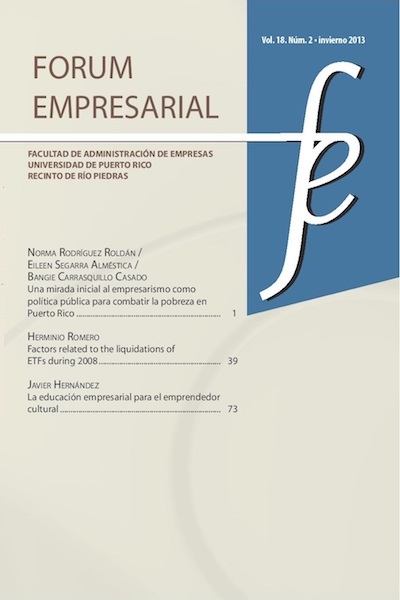Resumen
Más allá del desarrollo de la administración de las artes como campo académico y profesional, es necesario identificar el interés y necesidad de los artistasemprendedores en recibir herramientas de educación empresarial. Las industrias culturales tienen un alto nivel de autoempleo, por lo que cada vez más artistas necesitan estas destrezas para aumentar sus posibilidades de éxito. ¿Tienen interés en este tipo de educación? ¿Qué tipo de destrezas interesan desarrollar? ¿Cómo les gustaría recibirlas? A través de una encuesta, la investigación presenta las opiniones de 165 artistas en Puerto Rico sobre este tema, así como sus percepciones sobre aquellos factores que se deben considerar a la hora de elaborar la oferta educativa.Citas
Asuaga, C., Lecueder, M. & Vigo, S. (2005). The performing arts and the cost general theory. MPRA Paper No. 13742, Munich.
Benhamau, F. (2003). Artists ́ labour markets. Handbook of cultural economics (pp. 69-75). Massachusetts, USA: Edward Edgar Publishing.
Brkic, A. (2009). Teaching arts management: Where did we lose the core ideas? The Journal of Arts Management, Law, and Society, 38(4), 270-280.
Caves, R. (2000). Creative industries: Contracts between arts and commerce. Cambridge, MA: Harvard Press.
Colbert, Fs. (2003). Entrepreneurship and leadership in marketing the arts. International Journal of Arts Management, 6(1), 30-39.
Ebewo, P. & Sirayi, M. (2009). The concept of arts/cultural management: A critical reflection. The Journal of Arts Management, Law, and Society, 38(4), 281-295.
Eikhof, D. & Haunchild, A. (2006). Lifestyle meets market: Bohemian entrepreneurs in creative industries. Creativity and Innovation Management, 15(3), 234-241.
Elmeier, A. (2003). Cultural entrepreneurialism: On the changing relationship between the arts, culture and employment. The International Journal of Cultural Policy, 9(1), 3-16.
Evrard, Y. & Colbert, F. (2000). Arts management: A new discipline entering the millennium? International Journal of Arts Management, 2(2), 4-13.
Finn, A., McFadyen, S. & Hoskins, C. (1994). Marketing, management, and competitive strategy in the cultural industries. Canadian Journal of Communication, 19(3). Recuperado de http://www.cjc-online.ca/index.php/journal/article/viewArti-cle/831/737
Garnham, N. (2005). From cultural to creative industries: An analysis of the implications of the "creative industries" approach to arts and media policy making in the United Kingdom. International Journal of Cultural Policy, 11(1), 15-29.
Hamilton, B. (2000). Does entrepreneurship pay? An empirical analysis of the returns to self-employment. Journal of Political Economy, 108(3), 604-631.
Hesmondhalgh, D. & Pratt, A. (2005). Cultural industries and cultural policy. International Journal of Cultural Policy, 11(1), 1-13.
Jusoh, R., Ziyae B., Asimiran, S. & Kadir, S. (2011). Entrepreneur training needs analysis: Implications on the entrepreneurial skills needed for successful entrepreneurs. International Business & Economics Research Journal,10(1), 143-148.
Martinell, A. (2009). Las interacciones en la profesionalización en gestión cultural. Cuadernos del CLAEH, 2(32), 97-115.
Menger, P-M. (1999). Artistic labor markets and careers. Annual Review Sociology, 25, 541-574.
Ministerio de Cultura de Colombia. (2005). Arte y aparte: Manual para el emprendimiento en artes e industrias creativas. Recuperado de http://emprendimientosculturales.com/docs/49-arte-y-parte.
National Endowment for the Arts. (2008). Artist in the workforce: 1990-2005. Research Report # 48. Washington, DC: NEA.
Neck, H. & Greene, P. (2011). Entrepreneurship education: known worlds and new frontiers. Journal of Small Business Management, 49(1), 55-70.
Papandrea, F. & Albon, R. (2004). A model of employment in the arts. Australia: Blackwell Publishing Ltd.
Royseng, S. (2008). Arts management and the autonomy of art. International Journal of Cultural Policy, 14(1), 37-48.
Sommer, D. (2006). Cultural agency in the Americas. Durham, US: Duke University Press.
Throsby, D. (2001). Economics and culture. Massachusetts: Cambridge University Press.
Throsby, D. (2008). The concentric circles model of the cultural industries. Cultural Trends, 17(3), 147-164.
Throsby, D. & Hollister, V. (2003). Don ́t give up your day job: An economic study of professional artists in Australia. Sydney:Australia Council for the Arts.
United Nations Conference on Trade and Development. (2010). Creative economy: 2010 report. Geneva:United Nations.
Al someter una colaboración a la consideración de la Junta Editora de Fórum Empresarial, los autores aseguran que el trabajo enviado es original e inédito, que no ha sido ni será enviado simultáneamente a otra revista para su consideración y publicación, que son responsables del trabajo realizado y del contenido del artículo, y que tienen los derechos de autor correspondientes.
Los autores ceden a Fórum Empresarial los derechos patrimoniaes para la primera publicación de su obra, en cualquier medio y formato físico y electrónico, incluido internet. Su publicación estará sujeta a la Creative Commons Attribution-NonCommercial 4.0 International License, que permite a terceros compartir la obra, siempre que se indique su autor y Fórum Empresarial como primera publicación.
La revista permite a los autores mantener los derechos de publicación sin restricciones. Los autores podrán adoptar otros acuerdos de licencia no exclusiva de distribución de la versión de la obra publicada (por ejemplo, depositarla en un archivo telemático institucional o publicarla en un volumen monográfico), siempre que se indique la publicación inicial en Fórum Empresarial.

